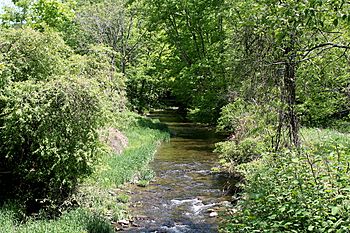Raven Creek facts for kids
Quick facts for kids Raven Creek |
|
|---|---|

Raven Creek in its lower reaches
|
|
| Physical characteristics | |
| Main source | Saint Gabriel Hill in southern Sugarloaf Township, Columbia County, Pennsylvania 1,240 to 1,260 feet (380 to 380 m) |
| River mouth | Fishing Creek in Fishing Creek Township, Columbia County, Pennsylvania 686 ft (209 m) 41°09′05″N 76°21′38″W / 41.15135°N 76.36050°W |
| Length | 8.1 mi (13.0 km) |
| Basin features | |
| Progression | Fishing Creek → Susquehanna River → Chesapeake Bay |
| Basin size | 11.90 sq mi (30.8 km2) |
| Tributaries |
|
Raven Creek is a stream in Columbia County, Pennsylvania. It flows into Fishing Creek. The creek is about 8.1 miles (13 kilometers) long. It flows through Sugarloaf Township, Benton Township, and Fishing Creek Township.
The area of land that drains into Raven Creek, called its watershed, is about 11.90 square miles (30.8 square kilometers). Many bridges have been built over the creek, including some old covered ones. Its main smaller stream, called a tributary, is East Branch Raven Creek.
Where Does Raven Creek Flow?
Raven Creek starts on Saint Gabriel Hill in southern Sugarloaf Township. This is near a place called Five Points. The creek flows south-southwest.
It reaches Benton Township within about a mile. In Benton Township, the creek flows into a valley. This valley is between Saint Gabriel Hill and Long Hill.
Journey Through Townships
Further downstream, Raven Creek turns south for a few miles. It crosses Pennsylvania Route 239. In the southern part of Benton Township, it meets its tributary, East Branch Raven Creek. Then, it turns southwest and leaves Benton Township.
After leaving Benton Township, the creek enters Fishing Creek Township. Soon after, it reaches the town of Stillwater. In Stillwater, Raven Creek enters the valley of Fishing Creek. It then turns southeast, flowing next to Fishing Creek. About a mile downstream, Raven Creek joins Fishing Creek.
Raven Creek joins Fishing Creek about 18.62 miles (29.97 kilometers) upstream from Fishing Creek's own mouth.
Main Tributary: East Branch Raven Creek
East Branch Raven Creek is the most important tributary of Raven Creek. It is about 2.9 miles (4.7 kilometers) long.
Geography and Water Area
The land around the mouth of Raven Creek is about 686 feet (209 meters) above sea level. The creek's source is higher up, between 1,240 and 1,260 feet (378 and 384 meters) high.
The total area of land that collects water for Raven Creek, its watershed, is 11.90 square miles (30.8 square kilometers).
Bridges Over Raven Creek
In the past, two covered bridges crossed Raven Creek. These were the Joe Ash Covered Bridge and the McHenry's Mill or Paperdale Covered Bridge. The Joe Ash Covered Bridge was about 27 feet (8.2 meters) long. Sadly, the McHenry's Mill bridge was destroyed in 1958, and the Joe Ash bridge was destroyed in 1963 or 1964.
Many other bridges have been built over Raven Creek over the years.
- A concrete bridge was built in 1928.
- Another bridge was built in 1950.
- Three more bridges were built between 1958 and 1963.
- A special bridge called a prestressed box beam bridge was built in 1968.
- A steel culvert bridge and a concrete culvert bridge were built in 1974 and 1976.
- The newest bridge mentioned was built in 2011.
In 1888, a book called A History of Columbia County, Pennsylvania described Raven Creek as "quite a stream."
History and Name Origin
Raven Creek might have once been called "Raving Creek." This name may have come from how wild the creek looked during floods. Later, the name changed to "Ravin' Creek" before becoming "Raven Creek."
In 1864, a group of army veterans and two civilians rode near Raven Creek. They were looking for soldiers who had left the army. This event was part of a larger story about an alleged military uprising called the Fishing Creek Confederacy.
Old Mills on the Creek
In 1865, a family built a gristmill at the mouth of Raven Creek in Stillwater. A gristmill grinds grain into flour. Later, this mill was changed into a paper mill. It was used to make wrapping paper.
From 1910 to 1912, a company from Scranton owned the mill. They used it to make a special kind of paper called cartridge paper.
Biology and Animal Life
East Branch Raven Creek, which flows into Raven Creek, is home to brook trout. These fish are able to reproduce and live in the stream.
Images for kids
 | Charles R. Drew |
 | Benjamin Banneker |
 | Jane C. Wright |
 | Roger Arliner Young |


